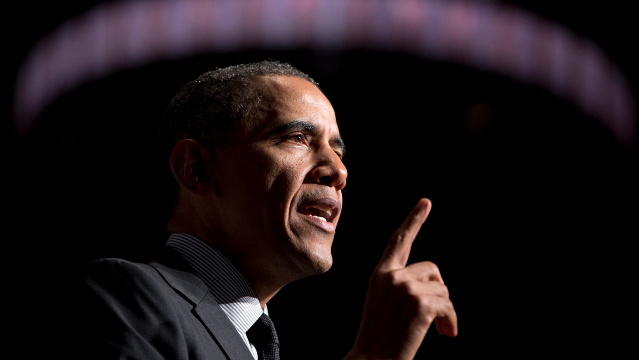
President Barack Obama speaks at Al Sharpton’s National Action Network conference in New York, Friday, April 11, 2014. (AP Photo/Carolyn Kaster)
This post originally appeared on Demos’ Policy Shop.
The same day President Obama was at Al Sharpton’s National Action Network conference deriding and lambasting voter ID laws, I was on a plane with the pro-voter ID blogger J. Christian Adams. Between the two of us, you won’t find two people at farther opposing ends of the voting rights spectrum. Adams, a former Justice Department attorney under Bush, and I have sparred and traded barbs via our blogs and Twitter over the issue, but on this day we shared neighboring exit row seats on a flight from Chicago to DC.
Before taking off, we bantered in a friendly way about a few things we knew we would disagree upon concerning elections. There was only so far I could push because I was outnumbered. Not far behind us sat Hans von Spakovsky, another voter ID cheerleader who works at Heritage Foundation. Despite their advantage, we managed to find a point of agreement, ironically on Obama’s speech at Sharpton’s headquarters. Neither of us thought it was an appropriate place for Obama to (finally) come out against voter ID laws.
That was the extent of our accord, though. We immediately departed when Adams said Obama’s visit was tantamount to if George W. Bush spoke at a Stormfront meeting. I worked at Southern Poverty Law Center in Montgomery, Ala. studying racist extremists like Stormfront and the Klan for years, but I didn’t need that expertise to know that his analogy didn’t hold by any stretch. We agreed that Obama’s choice of venue was poor, but for different reasons.
My beef with the location of Obama’s late attack on voter ID was that it was delivered before the mostly African American, mostly activist audience of the National Action Network. These are people who presumably work on behalf of NAN to fight voter suppression, who probably faithfully watch Sharpton’s weekly diatribes against voter ID laws on his MSNBC news show Politics Nation, and who helped organize activities around the 50th anniversary of the March on Washington last summer, where fighting voter ID was a priority agenda item. NAN definitely wasn’t Stormfront, but for voting rights purposes, it was the home front.
It wasn’t just me who thought Obama was preaching to the choir. On Monday, Andrew Cohen wrote at The Atlantic, “if the president is going to change the voting-rights debate, if he is going to win the argument he evidently feels strongly about making, he is going to have to preach to more than the converted.”
I agree with him here. But reading on, I have to depart with Cohen on his other reasons for why it was a bad place. Cohen believes Sharpton’s pad was a poor choice not only because they’re already “converted” (NAN never previously held an opposing view on ID), but also because he thinks the race of the audience is the wrong target. Voter ID laws “discriminate most directly based on class, not race,” argued Cohen.
While it’s true that those of low income have difficulties obtaining ID, many voter ID states, to their credit, have been accommodating the poor by providing paths to free IDs. Regardless, people of color can get tripped up by these laws no matter what’s in their checking account.
African Americans’ and Latinos’ ordeals with mass arrests/incarceration, stop-and-frisk and racial profiling laws lead to confiscations and complications with their drivers licenses that can screw them later at the polls. A study out of Wisconsin, where the Advancement Project and a team of civil rights groups are fighting a voter ID law in court, shows that people of color are not only less likely to have a drivers license than whites, but they also are more likely to have a license suspended or revoked. This is often the result of traffic stops. The Milwaukee Journal Sentinel found that black drivers in the city were seven times more likely to be stopped by police than white drivers, while Latino drivers were five times more likely. This was the case everywhere in the city, not just the poor parts. From the article:
The review found that the disparities spanned all seven police districts. The two with the greatest racial discrepancies – Districts 1 and 6 – have the lowest crime rates, and both have predominantly white populations.
Meanwhile, the Wisconsin statistics around ID are too gaping to attribute purely to class. A 2005 study by the UW-Milwaukee Employment and Training Institute found that slightly fewer than half of blacks and Latinos held a valid driver’s license in Milwaukee compared to 83 percent of whites. For young black men, only 22 percent had valid IDs compared to 43 percent of young Hispanic males and 64 percent of white males.
Further, studies out of Indiana and Georgia, states with two of the oldest voter ID laws in the nation, found that blacks and Latinos were less likely to have ID even after controlling for income and residential differences.
For Latinos, their ethnic last names and surnames are often wrongly registered on their photo IDs, which poses problems at the polls. Similar name impediments exist across gender and sex lines, but are more pronounced among women and transgender voters of color.
And then there’s the unavoidable proxy of class with race, the result of US laws and policies that have kept black household income far below that of their white counterparts. In America, race and class can’t be simply disaggregated for convenient purposes like determining who Obama should and shouldn’t be talking to.
Overall, though, the best predictor of whether someone votes is not income, but educational attainment, as political science professor Barry C. Burden noted in his expert testimony in the Wisconsin voter ID trial.
Economic disparities sometimes explain educational “achievement” gaps, except when they don’t, which is often. Authors of the just-released book Promises Kept: Raising Black Boys to Succeed in School and in Life found this out while leading a 12-year study on barriers to higher achievement for black boys (as seen in the PBS documentary The American Promise Project). That study spotlights data from the Harvard University Achievement Gap Initiative that found that black boys score low in national educational assessment tests compared to white boys, regardless of their parents’ class status. In fact, there’s a bigger gap among the black and white sons of college-educated parents than there is for the sons of less-educated parents.
The problem with Cohen’s thesis, like many class-based arguments, is that it assumes that if people of color just had more money, they could better evade racial discrimination. The data and lived experiences of people of color don’t support that, unfortunately. But Cohen’s argument seemed more grounded in opinions about Sharpton — opinions not far removed from that of J. Christian Adams.
Wrote Cohen:
The supporters of these laws say, correctly, that they do not discriminate on their face based upon race. That’s why the president cannot allow this to become a black-versus-white issue, even though black and Hispanic advocates are rightfully concerned about the impact these laws are having on their communities. The notion that this is a racial issue is only reinforced when he stands with Al Sharpton and tells that audience what it already knows to be true.
Agreed, this shouldn’t pit black voters versus white voters. But nothing Obama said at NAN suggested that’s what he was doing. Cohen implies that by standing with Sharpton, Obama is perhaps reinforcing an aspect of the debate — racism — that doesn’t need emphasizing. Black and Hispanic advocates are right to be concerned, says Cohen, but let’s not let their concerns drive the terms of the debate.
Voter ID impacts are racial, whether that makes us uncomfortable or not. White Americans who believe that racial discrimination is antithetical to democracy should oppose these laws for that reason alone. But it’s not just a racial issue. It’s also a class issue, a sex issue, a gender issue, a democracy issue and as my homey Ari Berman said this week, it’s a moral issue.
But if anything, the racism of voter ID laws is the part that has received too little attention where it matters. Note that Obama’s Commission on Election Administration somehow managed to avoid race (and voter ID) completely.
I agree that Obama should be taking his voter ID law criticisms to less safer places than the National Action Network. It would have been nice to hear him talk like this during the voter ID hearing held in Rhode Island, the lone Democratic voter ID state, the day before his NAN appearance. This blog from Steve Ahlquist of RIFuture.org is an excellent read on how an Obama debate with the state over voter ID might have went.
Despite that, I can’t help but come around to the idea that Sharpton’s place just might have been the perfect venue for, if nothing else, reminding everybody what’s really behind all of this: Racism.


